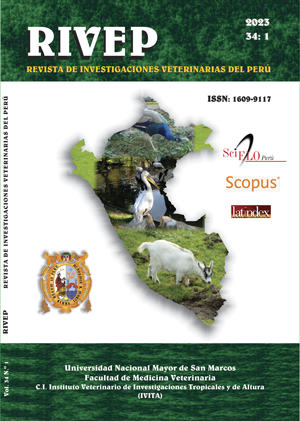Digestibility of diets with dehydrated citrus pulp for fattening rabbits
DOI:
https://doi.org/10.15381/rivep.v34i1.22962Keywords:
antioxidants, coefficients, flavonoids, fibre, energy, orangeAbstract
The aim of this study was to evaluate the nutritional composition and in vitro digestibility in rabbits of a pelleted feed using citrus pulp as a substitute for a conventional feed. It was used 24 adult rabbits (>80 days) distributed in four treatments (0, 10, 20 and 30%) with six repetitions. The experimental period was 12 days (7 for the adaptation period and 5 for the faeces collection). The orange pulp presented 7.4% crude protein (CP), 14.9% crude fibre (CF), 3.8% ether extract, 5.1% mineral matter, 4308 kcal/kg of gross energy and 385.76 mg polyphenols per 100 g of citrus pulp. CP levels decreased as the inclusion level of citrus pulp increased (16.77 to 17.85%), while the dry matter digestibility percentage increased with higher pulp inclusion levels. It is concluded that up to 30% of citrus pulp can be included in rabbit feed as a substitute for commercial concentrate without affecting nutrient digestibility.
Downloads
Downloads
Published
Issue
Section
License
Copyright (c) 2023 Juliana Alejandra Rubio Varela, Mayra Diaz Vargas, Carlos Felipe Duque Ramirez

This work is licensed under a Creative Commons Attribution 4.0 International License.
AUTHORS RETAIN THEIR RIGHTS:
a. Authors retain their trade mark rights and patent, and also on any process or procedure described in the article.
b. Authors retain their right to share, copy, distribute, perform and publicly communicate their article (eg, to place their article in an institutional repository or publish it in a book), with an acknowledgment of its initial publication in the Revista de Investigaciones Veterinarias del Perú (RIVEP).
c. Authors retain theirs right to make a subsequent publication of their work, to use the article or any part thereof (eg a compilation of his papers, lecture notes, thesis, or a book), always indicating the source of publication (the originator of the work, journal, volume, number and date).










